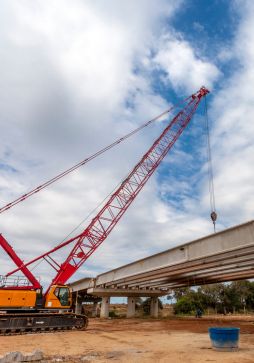Canada is gearing up for a transformative year in 2024, with several ambitious infrastructure projects set to break ground. These projects aim to enhance transportation networks, expand public utilities, and foster economic growth. As the country focuses on sustainable development, key initiatives are being launched to address growing urban needs and support long-term economic resilience top construction projects. With a focus on modernizing existing infrastructure, Canada is positioning itself as a leader in sustainable urban development sustainable urban projects.
Construction firms looking to capitalize on these opportunities can benefit from tools like Building Radar, which offers early project data, AI-powered insights, and automated outreach to optimize project acquisition strategies project acquisition optimization. By identifying projects early, companies can secure contracts and streamline project execution early project identification.
Overview of Major Infrastructure Projects in 2024
1. Toronto’s Ontario Line Subway Expansion
One of the largest and most impactful projects in 2024 is the Ontario Line Subway expansion in Toronto, designed to improve connectivity and reduce congestion in Canada’s largest city Toronto subway expansion. The project, estimated to cost over $10 billion, aims to create a more efficient public transit system, enhancing accessibility and reducing travel times enhancing urban mobility. The Ontario Line will connect key areas of Toronto, making it easier for commuters to access the downtown core.
By utilizing Building Radar’s data-driven tools, construction firms can stay ahead of competitors by identifying opportunities to bid on large-scale projects like the Ontario Line bidding strategies.
2. British Columbia’s Pattullo Bridge Replacement
The Pattullo Bridge replacement project in British Columbia is another significant initiative set to launch in 2024. This new four-lane bridge will improve safety and reduce congestion between Surrey and New Westminster bridge infrastructure improvements. Estimated at $1.4 billion, the project is focused on integrating sustainable construction practices, which aligns with Canada’s commitment to reducing its carbon footprint sustainable construction initiatives.
Building Radar’s tools provide construction teams with real-time project updates, allowing them to adjust their strategies based on the latest data real-time project data. This helps firms align their resources and expertise with emerging market needs.
The Role of Government Investments in Infrastructure Development
3. Federal Investments in Green Infrastructure
In 2024, the Canadian government is prioritizing investments in green infrastructure to promote sustainability and climate resilience green infrastructure funding. Projects focused on renewable energy, waste management, and sustainable transportation are set to receive significant funding. These initiatives are designed to reduce greenhouse gas emissions and foster sustainable growth in urban areas fostering sustainability.
By using Building Radar, construction firms can identify early-stage green projects and adjust their business strategies to align with government priorities government project alignment. This not only improves a firm’s chances of securing contracts but also helps them contribute to Canada’s sustainability goals.
Innovations in Infrastructure: The Use of AI and Technology
4. Smart Highways and Digital Infrastructure
Canada is also investing in smart highways, incorporating IoT technologies to enhance traffic management and safety smart infrastructure projects. These highways are designed to optimize traffic flow, reduce accidents, and improve fuel efficiency. The integration of digital infrastructure will also support autonomous vehicles, paving the way for smarter and safer transportation systems.
Building Radar’s AI-driven tools help firms identify digital infrastructure projects early, enabling them to adjust their bidding strategies to stay competitive AI in construction. The platform’s predictive analytics allow firms to focus on projects with the highest potential for success.
5. Expanding Renewable Energy Projects
As part of its commitment to achieving net-zero emissions by 2050, Canada is expanding its portfolio of renewable energy projects renewable energy expansion. Projects like the development of offshore wind farms, solar power plants, and hydroelectric facilities are set to receive substantial investment in 2024. These initiatives not only reduce Canada’s carbon footprint but also create thousands of jobs in the clean energy sector job creation in renewable energy.
How Building Radar Supports Canadian Construction Firms
Building Radar provides construction companies with a competitive edge by offering tools that streamline project acquisition, optimize sales processes, and enhance communication with stakeholders sales optimization. By leveraging AI technology, firms can identify high-margin projects early, improving their chances of securing contracts project acquisition benefits.
Benefits of Using Building Radar for Canadian Projects
- Automated Lead Generation: Identify high-value projects with minimal effort, saving time and resources automated lead strategies.
- CRM Integration: Seamlessly integrate with Salesforce, HubSpot, and other CRM platforms to streamline communication CRM tools for construction.
- Data-Driven Insights: Use predictive analytics to focus on projects with the highest success rates predictive project analytics.
Conclusion
The year 2024 promises to be a transformative period for Canada’s infrastructure sector. From the Ontario Line Subway expansion to the Pattullo Bridge replacement, these projects are set to redefine Canada’s urban landscape while supporting economic growth and sustainability. By using tools like Building Radar, construction firms can optimize their project strategies, secure lucrative contracts, and contribute to the nation’s sustainable development goals.
Building Radar’s AI-powered solutions provide real-time data and automated outreach tools, enabling construction companies to stay ahead in a competitive market. As Canada continues to invest in modernizing its infrastructure, having access to early project insights and leveraging data-driven decision-making will be crucial for success.
Relevant Links for Further Reading:
- Top 10 Largest Construction Project Starts in Canada
- Canada’s Top 100 Infrastructure Projects
- Smart Infrastructure Projects in Canada
- Biggest Infrastructure Project in the US for 2025
- Leveraging Data to Drive Business Development Decisions
- Creating Targeted Outreach Strategies for New Construction Projects
- Identifying Emerging Trends in the Construction Industry









